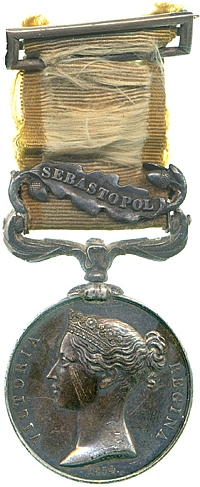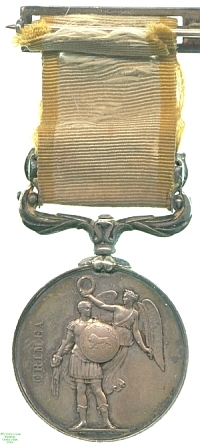
Obverse, a bust of Queen Victoria

Reverse, a Roman warrior being wreathed by the flying Victory

Obverse, a bust of Queen Victoria |

Reverse, a Roman warrior being wreathed by the flying Victory |
Rivalry between Britain and Russia over India, and between Russia and France over the protection of Christians under Ottoman rule, led in the 1850s to a focus of diplomatic attention on the ailing Ottoman Empire. British diplomatic successes led to a Russian attempt to annexe the Danubian principalities of Moldavia and Wallachia from the Ottomans, as well as the Russian destruction of the Ottoman Black Sea fleet when Turkey went to war in retaliation. Britain and France moved in support of the Ottomans and although the Danubian provinces were returned the allies' conditions for peace far exceeded this. The Russian refusal to meet these conditions led to full-scale international war in late 1854.
The war was mainly composed of allied attempts to reduce Russian fortresses on the Black Sea (and also on the Baltic, of which only the lengthy siege of Sevastopol was successful, but Russian attrition there and elsewhere was so heavy and the Russian ability to force withdrawal on the allies so inadequate that Tsar Nicholas I made peace in 1856.
This medal was issued for participation in the long siege of Sevastopol. It was awarded to Lieutenant Colonel Lawrence Fyler of the 12th Lancers, whose medal group has come entire into the Watson Collection and shows a career spent in India and the East fighting for the Crown from the 1830s to the 1850s.
This medal is attached to two others and the catalogue of the Watson Collection considers it as part of Group 8 (this comprising two assemblages and two loose medals). For provenance of the group see those entries.